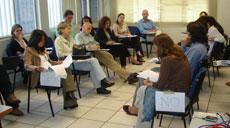103 results for semantic web research topics
I've rounded up over 60 Semantic Web blogs for your reading and subscribing pleasure! These blogs are just a portion of the sources being indexed regularly by the soon-to-be-launched Planet Semantic Focus. Enjoy!
Continue reading 60+ Semantic Web Blogs (List)
This entry is a response to I will never support the Semantic Web by Brian of d'bug.
I'm getting tired of reading about how the Semantic Web is some kind of pipe dream that will never be realized. The Semantic Web is completely and entirely within our technological reach. People may have been given the impression that we cannot create the Semantic Web because of its complexity, the number of years it has been in development, or even the unanswered questions that still exist for certain problems we will face. These are valid reasons to doubt our progress, but progress is certainly what we are making.
Continue reading Some People Will Never Support the Semantic Web
The 5th European Semantic Web Conference (ESWC 2008) is being held in Tenerife, Spain from June 1 to June 5, 2008. The conference is still in its early organizational stage so a list of speakers has not yet been included, nor has a schedule been set for the presentations. ESWC 2008 will feature a tutorial program, system descriptions and demos, a posters track, a Ph.D. symposium and a number of collocated workshops.
Continue reading ESWC 2008: 5th European Semantic Web Conference
 To begin with, there is a very simple idea: Websites should themselves indicate their changes to the search engines. I've already touched upon the subject in the previous part of this series, right now search engines have a reversed approach which consists of crawling the Web constantly looking for the slightest modification. Don't you think it's silly? Think about the number of Web pages to visit, imagine the cost to get the lowest frequency between each visit. Consequently, it seems difficult to consider the development of new search engines today. Nevertheless, the advent of the Semantic Web should lead to their multiplication, in a vertical way, while search engines are getting specialized more and more in specific fields.
To begin with, there is a very simple idea: Websites should themselves indicate their changes to the search engines. I've already touched upon the subject in the previous part of this series, right now search engines have a reversed approach which consists of crawling the Web constantly looking for the slightest modification. Don't you think it's silly? Think about the number of Web pages to visit, imagine the cost to get the lowest frequency between each visit. Consequently, it seems difficult to consider the development of new search engines today. Nevertheless, the advent of the Semantic Web should lead to their multiplication, in a vertical way, while search engines are getting specialized more and more in specific fields.
Continue reading The Object Oriented Web - Part 2 - Datahubs
 Semantically-Interlinked Online Communities (SIOC for short) is a framework aimed at connecting online communities and discussions from blogs, forums, content management systems mailing lists, and anything else. In the current Web, communities such as forums and blogs are like islands - they contain valuable information but are not well connected or queryable. SIOC allows you to connect these sites, and enables the extraction of semantic information from unlimited discussion platforms.
Semantically-Interlinked Online Communities (SIOC for short) is a framework aimed at connecting online communities and discussions from blogs, forums, content management systems mailing lists, and anything else. In the current Web, communities such as forums and blogs are like islands - they contain valuable information but are not well connected or queryable. SIOC allows you to connect these sites, and enables the extraction of semantic information from unlimited discussion platforms.
Continue reading Connect Discussions Between Blogs, Forums, and more with SIOC
 We want everybody to communicate freely by crossing the barriers of language differences and cultural variety. This is the commonly agreed upon ultimate goal of the Semantic Web. How we are to realize the Semantic Web in particular is, however, another story. Typically, there are two thoughts on how to achieve this common goal. One thought is to build a web of data; the other is to build a web of agents. Nevertheless, these two thoughts approach the same goal and represent two different philosophies. This philosophical difference may eventually determine the fate of these two approaches.
We want everybody to communicate freely by crossing the barriers of language differences and cultural variety. This is the commonly agreed upon ultimate goal of the Semantic Web. How we are to realize the Semantic Web in particular is, however, another story. Typically, there are two thoughts on how to achieve this common goal. One thought is to build a web of data; the other is to build a web of agents. Nevertheless, these two thoughts approach the same goal and represent two different philosophies. This philosophical difference may eventually determine the fate of these two approaches.
Continue reading Abandon Babel, Welcome Society: The Philosophy Behind Semantic Web Approaches
 Swoogle describes itself as being the search engine for the Semantic Web. Swoogle crawls the web looking for RDF documents. At this time Swoogle offers the these services:
Swoogle describes itself as being the search engine for the Semantic Web. Swoogle crawls the web looking for RDF documents. At this time Swoogle offers the these services:
- Search ontologies and instance data
- Search terms (URIs that have been defined as classes and properties)
- Provide metadata of Semantic Web documents
- Support browsing the Semantic Web
- Archive different versions of Semantic Web documents
Continue reading Swoogle - the Semantic Web search engine
After the last post about "web of agents", I received a few questions about the "web of data." A few readers mistook my argument to be opposite of a web of data. Don't get me wrong, I have never been opposed to the presentation of a "web of data." I only emphasize that the web-of-data presentation is short of describing the human-web relationship in the Semantic Web. To encourage the engagement of more ordinary people to the grand vision of the Semantic Web, we need a more user-oriented presentation, i.e. a web of agents.
Continue reading Metadata or Hyperdata, Link or Thread, What is a Web of Data?
This post is a complement to the grassroots vs. ivory towers discussion. In the previous post, James mentioned two trends of realizing the dream of the Semantic Web. While the grassroots way encourages the wider adoption of the Semantic Web, the ivory-tower way stimulates the construction of Semantic Web standards. Besides all of these, these two sides indeed play different roles in weaving the Web — the destiny of web evolution.
Continue reading Weaving the Thread-Driven Semantic Web
 The Curse of Knowledge: the more you know, the more difficult it is for you to communicate knowledge. When we know something, we can hardly imagine not knowing it. The more we learn about something, the more it becomes even harder for us to think of not knowing it. It is generally difficult for experts (who know much) to explain their expertise to laymen (who know little) because experts have to try hard to imagine the scenario when they were not experts. This is the Curse of Knowledge.
The Curse of Knowledge: the more you know, the more difficult it is for you to communicate knowledge. When we know something, we can hardly imagine not knowing it. The more we learn about something, the more it becomes even harder for us to think of not knowing it. It is generally difficult for experts (who know much) to explain their expertise to laymen (who know little) because experts have to try hard to imagine the scenario when they were not experts. This is the Curse of Knowledge.
Continue reading The Curse of Knowledge and the Semantic Web
Recent searches
semantic, semantic web search, microsoft semantic web, semantic web blog, semantic focus, semantic web search engine, semantic web problems, semantic cms, semantic web search engines, semantic web, semantic web blogs, camp semantic, semantic web layer cake, natural language processing blog, semantic web microsoft, sparql php, semantic blog, natural language search, true knowledge, eswc 2009, object oriented web, protege tutorial video, rdf tags, introduction to semantic web, php sparql, microsoft rdf, microformats rdf, semantic web conference 2008, owl semantic web, problems with semantic web, rdf vs microformats, cody burleson, protege tutorial, rdf search engine, microformats vs rdf, rdf microformats, semantic web tutorial, semantic web conference 2009, rdf blog, eswc 2008, graphd, rdf microformat, semantic web rdf, blog semantic web, semantic web conference, european semantic web conference 2009, dbpedia freebase, web service life cycle, semanticfocus, python sparql, problems in semantic web, swoogle, curse of knowledge, semantic web introduction, semantic web issues, statistical search, semantic web layers, semantic web vision, twine blog, semantic web podcasts, owl videos, rdf tagging, semantic web natural language processing, arc rdf, falcons search engine, protege 4 tutorial, web videos, european semantic web conference 2008, semantic search engine, semantic web community, semantic web tutorials, semantic natural language processing, semantic web problem, semantic web videos, microformat rdf, natural language processing semantic web, web search engines, open calais, problems with the semantic web, rdf tag, semantic web cake, web thread, tower of babel, bin laden, rdf microsoft, semantic web technology stack, natural language processing blogs, natural language question answering, rdf owl, protege screencast, semantic web logo, problems of semantic web, information extraction blog, microformat vs rdf, protege video tutorial, domain knowledge, james simmons, seesaw effect, semantic search, semantic web references, the curse of knowledge, web 3.0 ideas, web semantic, blog semantic, cms tags, question answering, semantic web games, semantic web technology, aditya thatte, rdf video, spanish semantics, web evolution, data storage in oracle, different from, freebase rdf, microsoft and semantic web, problems semantic web, rdf vs microformat, web search engine, what is true knowledge, freebase dbpedia, jamie lewis blog, question answering wikipedia, semantics, web service ontology, zitgist, freebase linked data, introduction to semantic web vision and technologies, ontology blog, owl introduction, protege semantic, selfishness, semantic update, semantic web protege, focus semantics, freebase vs dbpedia, microformats and rdf, microformats vs, microformats vs semantic web, owl tags, protege semantic web, search engine semantic web, semantic web owl, altova tutorial, backlinks blog, calais initiative, eswc 2008 semantic, protege, semantic web microformats, semantic web research topics, semantic web technologies, arc semantic, natural language semantic web, oracle semantic web, owl semantic, problem with semantic web, rdf, semantic web layer, semantic web tags, service ontology, sparql python, vertical search engines, web blogs, blog rdf, cms semantic, dbpedia vs freebase, hyperdata, natural language processing semantics, ping the semantic web, python semantic web, rdf and microformats, semantic search engines, semantic search example, semantic web services, web object oriented, wikipedia question, wordpress semantic web, information extraction, international semantic web conference 2009, list of vertical search engines, microformats, microformats versus rdf, natural language processing, natural language processing wikipedia, object oriented web page, semantic conference 2008, semantic conference 2009, semantic web conferences 2008, semantic web conferences 2009, semantic web feed, semantic web video, social semantic web, w3c logo, web introductions, webblogs, evolution of semantic web, iri semantic web, issues in semantic web, language question, natural language question answering system, on whose vision is the semantic web concept based, oracle data storage, protege 4.0 tutorial, protege ontology, rdf versus microformats, search engines, search semantic web, semantic data storage, semantic web reference, service, web 3.0 opportunities, web services life cycle, aperture semantic, backlink blog, blog semantics, falcons semantic, hl, introduction of semantic web, leave a comment, legs blog, list of blogs, microsoft semantic web, natural language processing semantic, problem of semantic web, problem semantic web, protege tutorials, rdf blogs, rdf review, semantic web 101, semantic web conferences, semantic web natural language, semantic web podcast, semantic web searches, semantics is, service life cycle, service ontologies, vertical search engines list, web conference 2008, wikipedia natural language processing, arc semantic web, blog natural language processing, european semantic web 2008, foaf search, international semantic web conference, international semantic web conference 2008, introduction to semantic, iswc 2008, life cycle of web services, metadata extraction and tagging service, microformats tags, microsoft sparql, object oriented web pages, owl vs rdf, semantic news aggregator, semantic web 2009, semantic web algorithm, semantic web evolution, semantic web game, semantic web layer cake 2008, semantic web service, semantic web sites, service modeling, spanish semantic, sparql in php, tassilo pellegrini, the nature of selfishness, the semantic web is not a separate web but an extension, tutorial protege, camps semantics, eswc 2008 conference, eswc 2008 semantic web, falcons semantic web search engine, freebase, lowell vizenor, metadata extraction, natural language question, nature of selfishness, object oriented web site, oracle semantic store, owl rdf, pagead2.googlesyndication.com, problems of the semantic web, protege 4, rdf vs. microformats, search engines semantic web, semantic logo, semantic markup tags, semantic web searching, semantic web tools, spanish language semantics, starting a revolution, swoogle.com, tag rdf, the semantic web vision, web service lifecycle, wikipedia question answering, arc php, arc rdf php, blogs semantic web, dbpedia, focus, folktologies, microformats vs. rdf, mining tags, ontology, open calais python, podcast semantic web, problem in semantic web, protege introduction, rdf semantic web, search engine for semantic web, selfishness of mankind, semantic problems, semantic updates, semantic web algorithms, semantic web and search engines, semantic web feeds, semantic web part 4, semantic web vs web 2.0, service lifecycle, stochastic search, storage in oracle, using protege, weaving thread, web 3.0 blog, web technology topics, webservice lifecycle, zeitguiest, blog information extraction, blogs on semantic web, camp semantic, conference semantic web 2008, cross pollination wikipedia, eswc conference 2008, eswc tenerife, ftp p2p, information extraction open source, introduction semantic web



 We want everybody to communicate freely by crossing the barriers of language differences and cultural variety. This is the commonly agreed upon ultimate goal of the Semantic Web. How we are to realize the Semantic Web in particular is, however, another story. Typically, there are two thoughts on how to achieve this common goal. One thought is to build a web of data; the other is to build a web of agents. Nevertheless, these two thoughts approach the same goal and represent two different philosophies. This philosophical difference may eventually determine the fate of these two approaches.
We want everybody to communicate freely by crossing the barriers of language differences and cultural variety. This is the commonly agreed upon ultimate goal of the Semantic Web. How we are to realize the Semantic Web in particular is, however, another story. Typically, there are two thoughts on how to achieve this common goal. One thought is to build a web of data; the other is to build a web of agents. Nevertheless, these two thoughts approach the same goal and represent two different philosophies. This philosophical difference may eventually determine the fate of these two approaches.
 The Curse of Knowledge: the more you know, the more difficult it is for you to communicate knowledge. When we know something, we can hardly imagine not knowing it. The more we learn about something, the more it becomes even harder for us to think of not knowing it. It is generally difficult for experts (who know much) to explain their expertise to laymen (who know little) because experts have to try hard to imagine the scenario when they were not experts. This is the Curse of Knowledge.
The Curse of Knowledge: the more you know, the more difficult it is for you to communicate knowledge. When we know something, we can hardly imagine not knowing it. The more we learn about something, the more it becomes even harder for us to think of not knowing it. It is generally difficult for experts (who know much) to explain their expertise to laymen (who know little) because experts have to try hard to imagine the scenario when they were not experts. This is the Curse of Knowledge.
Recently Commented Blog Entries